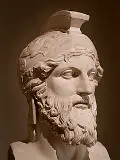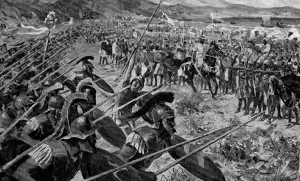Miltiades: Military Hero of Marathon
One of the heroes of the monumental Greek victory at the Battle of Marathon was Miltiades. Miltiades was born the son of Cimon, a champion Olympic chariot racer, in 550. The boy was named after another chariot racing champion, his father's half-brother, who was known as Miltiades the Elder thereafter. 
The elder Miltiades left Athens in 555 B.C. to start a colony on what is now the Gallipoli Peninsula but was then the Chersonese. He declared himself the tyrant in charge of the colony. Miltiades the Younger, meanwhile, worked his way up in city politics and was archon in 524 B.C. When his father died four years later, his brother Stesagoras assumed the tyranny of Chersonese, an area north of Troy. Another four years on, Stesagoras was dead in an act of treachery and Miltiades the Younger had arrived in Chersonese to rule, in the process cementing an alliance with King Olorus of Thrace by marrying his daughter, Hegesipyle. The 6th Century B.C. was the time of great expansion of the Persian Empire. The king in 513 B.C. was Darius I, and it was in that year that Darius arrived with a huge force in Chersonese, claiming possession of it. Miltiades had no choice but to accept Darius's overlordship. Miltiades marched in the Persian expedition against Scythia and was charged with guarding a bridge across the Danube River. A plot to destroy the bridge and strand Darius and the Persians was foiled, and Miltiades came under suspicion. He fled and found friends in the Ionian colonies, who revolted against Persian authority in 499 B.C. Seeing the writing on the wall, he fled to Athens in 492 B.C. The reception he got initially was a frosty one. Athens had by this time become a democracy, under the reforms of Cleisthenes, and Miltiades had a history of authoritarian rule. However, he also had intimate knowledge of Persian battle formations and tactics. He was one of 10 strategoi, or generals, elected in 490 B.C. Overseeing the strategoi was the polemarch, or war ruler, a man named Callimachus. When the Persians launched their invasion, the strategoi were split 5–5 on whether to attack or trust in the walls of Athens as defense against an anticipated siege. Miltiades convinced Callimachus to support an attack. 
Miltiades used his knowledge of the Persian army to good use, helping shape the strategies that resulted in a Greek victory at Marathon. In particular, he urged his fellow Athenians to throw caution to the wind and abandon their traditional mode of attack in favor of a swift charge. It worked t perfection. He was definitely a hero on the day. In the very next year, however, he would meet his greatest defeat. In 489 B.C., Miltiades led a naval attack on the Cyclades, a few Greek-held islands whose people had sided with Persia. The defenders repulsed the attack, and Miltiades was seriously wounded in the attack. He returned to Athens, unable to move much or otherwise defend himself; his enemies took the opportunity to charge with treason and convince the jury to convict him and sentence him to death. A judge weakened the sentence to a stiff fine, which Miltiades could not pay; he went to prison, where he died of complications from his injury. He was buried in a tomb next to men who had died at Marathon. His son Cimon paid his debts. |
|
Social Studies for Kids
copyright 2002–2024
David White




